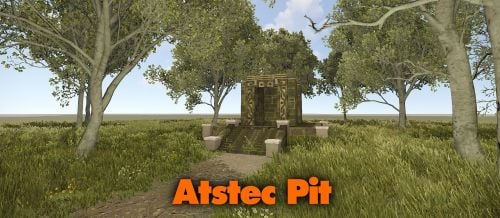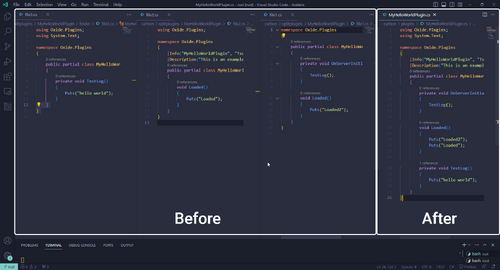Search the Community
Showing results for tags 'development'.
-
-
Version 1.0.0
81 downloads
The PlayerEventStates plugin provides a system to manage and track event states for individual players and globally across the server. This system can be particularly useful for developers who wish to create conditional gameplay mechanics based on specific events or states. Features Player-Specific Event States: Allows tracking of individual player event states. Global Event States: Provides a mechanism to track global events that apply server-wide. API Access: Exposes several API methods for developers to interact with the system, making it versatile for integration with other plugins or custom scripts. Data Persistence: Ensures that both player-specific and global event states are saved and can be loaded across server restarts. API Methods (For Developers) GetEventStatePlayer_API(ulong playerId, string eventName); // Fetches the event state for a specific player. GetEventStateGlobal_API(string eventName); // Retrieves the global event state. SetEventStatePlayer_API(ulong playerId, string eventName, bool value); // Sets the event state for a specific player. SetEventStateGlobal_API(string eventName, bool value); // Modifies the global event state. PlayerHasRecquiredStates_API(ulong playerId, Dictionary<string,bool> states); //Checks if a player meets specific event state conditions. Usage Examples Quest Systems: If you're developing a quest system, you can use event states to track a player's progress. For instance, if a player completes a task, you can set an event state to true. This can then influence future interactions or dialogues with NPCs. Dynamic World Events: Global event states can be used to track server-wide events. For example, if a server-wide event like a festival is active, you can set a global event state. This could change interactions or available quests for all players. Conditional Dialogues: As mentioned, integration with the Dialogs plugin can lead to dynamic dialogues. An NPC might have different dialogues for players who have or haven't completed specific tasks. Setup & Configuration Ensure the PlayerEventStates plugin is installed on your server. The plugin will automatically create necessary data files in the oxide/data/PlayerEventStates directory. Developers can directly interact with the plugin using the provided API methods. Note for Developers: When developing with this plugin, pay special attention to the variables ending with _API. These are the methods you'll primarily interact with to get or set event states. Conclusion The PlayerEventStates plugin is a powerful tool for developers looking to add depth and dynamism to their Rust servers. By tracking both player-specific and global event states, it opens up a plethora of gameplay possibilities, especially when combined with plugins like Dialogs. Whether you're crafting a complex quest system or just want NPCs to recognize player achievements, PlayerEventStates is a valuable addition to your plugin arsenal. Support : You can also contact me via discord : https://discord.gg/JJnxFgP27GFree- 1 comment
-
- 2
-

-
- #development
- #developer api
-
(and 5 more)
Tagged with:
-
Version 1.1.3
28 downloads
Introducing the Split Plugin Loader for Rust! This innovative tool revolutionizes the way plugins are managed and loaded by amalgamating multiple files for a single plugin and seamlessly compiling them into one cohesive unit. If you have been dealing with a single massive plugin file and ever wished for a more streamlined, organized approach, the Split Plugin Loader is your answer. Whether you're working with Oxide or Carbon, the Split Plugin Loader seamlessly integrates, ensuring a more streamlined and enhanced plugin experience. Key Features: Runtime Compilation: The Split Plugin Loader dynamically compiles your plugin files as you write them, ensuring real-time efficiency and flexibility. Streamlined File Management: With the freedom to name and organize your files as you see fit, the Split Plugin Loader ensures that everything culminates under the primary folder name, simplifying your project management. Cross Build: Add directives [CARBON] or [OXIDE] to methods or top level variables and it will only build for your current name space. For usings you do //[CARBON] or //[OXIDE]. Broad Compatibility: Whether you're on Oxide or Carbon, the Split Plugin Loader has got you covered. Experience seamless integration with both platforms without a hitch. Obfuscation Support(Coming Soon): Keep your code shielded. Planned obfuscation support aims to provide enhanced security, protecting your plugins against unauthorized access and tampering. Automatic Code Formatting (Coming Soon): Guarantee code consistency across the board. Our upcoming automatic code formatting tool ensures your plugins maintain a clean and standardized code structure. How to Use: 1. Install: Place the extension inside your carbon/extensions folder. 2. Setup: Create a new folder inside the splitplugins directory. Name this folder with your desired plugin name. 3. Plugin File Creation: Create your separate plugin files within this folder. Here's a simple guide using an example: //splitplugins/MyHelloWorldPlugin/serverinit.cs: //[OXIDE] using Oxide.Core; //[CARBON] using Carbon.Core; namespace Oxide.Plugins { public partial class MyHelloWorldPlugin { private void OnServerInitialized() { TestLog(); } #region hello void Loaded() { Puts("Loaded2"); } #endregion [OXIDE] void OxideMethod(){ } [CARBON] void CarbonMethod(){ } } } //splitplugins/MyHelloWorldPlugin/declare.cs: using Oxide.Plugins; namespace Oxide.Plugins { [Info("MyHelloWorldPlugin", "Tsunderella", "1.0.0")] [Description("This is an example")] public partial class MyHelloWorldPlugin : CarbonPlugin { void Loaded() { Puts("Loaded"); } } } //splitplugins/MyHelloWorldPlugin/functions/testlog.cs: using Oxide.Plugins; using System.Text; namespace Oxide.Plugins { public partial class MyHelloWorldPlugin { private void TestLog() { Puts("hello world"); } } } 4. Output: Once the Split Plugin Loader processes these files at runtime, they are compiled into: //plugins/MyHelloWorldPlugin.cs using Oxide.Plugins; using Oxide.Core; using System.Text; namespace Oxide.Plugins { [Info("MyHelloWorldPlugin", "Tsunderella", "1.0.0")] [Description("This is an example")] public class MyHelloWorldPlugin : RustPlugin { private void OnServerInitialized() { TestLog(); } #region hello void Loaded() { Puts("Loaded2"); Puts("Loaded"); } #endregion void OxideMethod(){ } private void TestLog() { Puts("hello world"); } } } Obfuscator: using Oxide.Plugins; namespace Oxide.Plugins { [FormatCode] //This will enable formatting(not implemented fully) [EnableBasicObfuscation] //This enables basic obfuscation [Info("MyHelloWorldPlugin", "Tsunderella", "1.0.0")] [Description("This is an example")] public class MyHelloWorldPlugin : RustPlugin { [DoNotObfuscate] //Don't obfuscate this variable public string shouldNotObfuscate = "hello"; private string shouldObfuscate = "world"; [DoNotObfuscateMethod] //Do not obfuscate the method name private void OnServerInitialized() { TestLog(); } [DoNotObfuscateMethod] //Do not obfuscate the method name void Loaded() { Puts("test2"); var hello = "world"; var world = "hello"; Puts("HelloWorld312"); } private void TestLog() { Puts("and even here2"); } [DoNotObfuscate]//Don't obfuscate anything in this method(unless it's calling a method that's been obfuscated void TestMethod2() { string testing = "hello"; } void TestMethod(string test) { shouldObfuscate = test; TestLog(); } } } Output(This is just basic obfuscation for now): using Oxide.Plugins;using System.Text;namespace Oxide.Plugins{[Info("MyHelloWorldPlugin", "Tsunderella", "1.0.0")][Description("This is an example")]public partial class MyHelloWorldPlugin : RustPlugin{public string shouldNotObfuscate = "hello";private string v_0055f67d = "world";private void OnServerInitialized(){m_a172963e();}void Loaded(){Puts("test2");var hello = "world";var world = "hello";Puts("HelloWorld312");}private void m_a172963e(){Puts("and even here2");}void TestMethod2(){string testing = "hello";}void m_c73515cb(string test){v_0055f67d = test;m_a172963e();}}} Your feedback shapes the future. For any queries, challenges, or suggestions, our dedicated support team is eager to assist. Embrace the next level of Rust development with the Split Plugin Loader! A Personal Note: Behind every piece of code there is a story. As someone who is heavily dyslexic, I found navigating through large code bases daunting. If you want to have this as a requirement or just to compile a large plugin and distribute the end result is up to you. I saw on the forums people where asking how to split plugins into multiple files and I personally think it's obnoxious splitting up a plugin into multiple plugins(except when it does more than one function) then you even have to wait for dependencies to load and what not.$10.00 -
I'm a typescript/react dev (on the web-side), and was just wondering why I haven't seen any servers, plugins, or tools utilizing React type frameworks like React Core, or NextJS, or even something like Remix? Is this in terms of limitations of what we can do with communication between the server and webhost? Or would I be fine creating my website based off any framework? I feel as if this may be an irrelevant post as I am pretty sure it doesn't matter as long as the webhooks communicate the way they need to communicate, it should all work the same ideally, right?
-
Hello! I'm David and I've been running rust services for over a year now! I've built up a client base and decided to reopen up my services discord with my close friend Shady4u! You might know him from sone of his products like simple splitter or simple symmetry. With summer coming up we're running full steam ahead with the possibility of you getting anything you need made within one community. Join the services discord: here
-
- 1
-

-
- #services
- #development
-
(and 5 more)
Tagged with:








